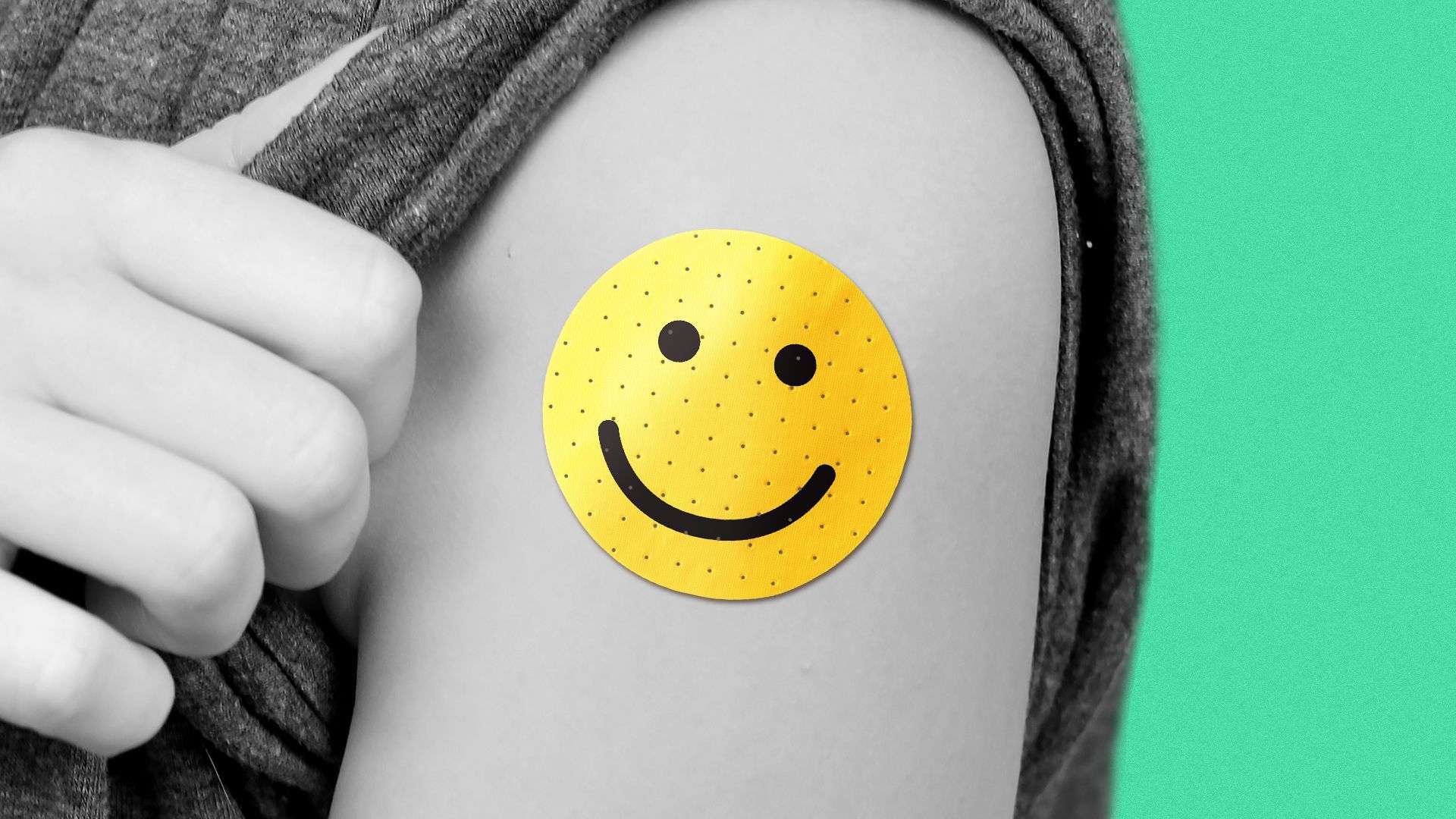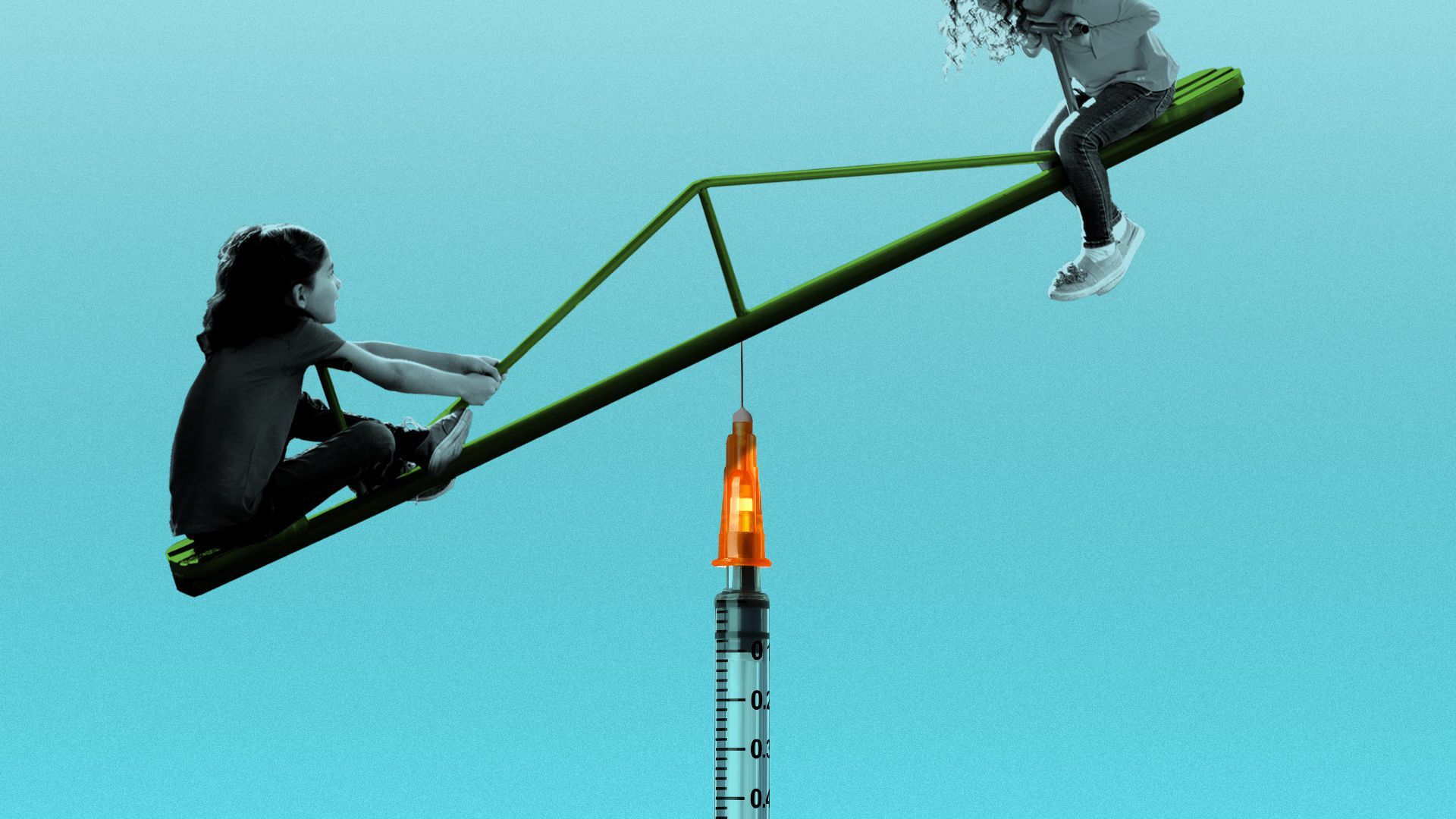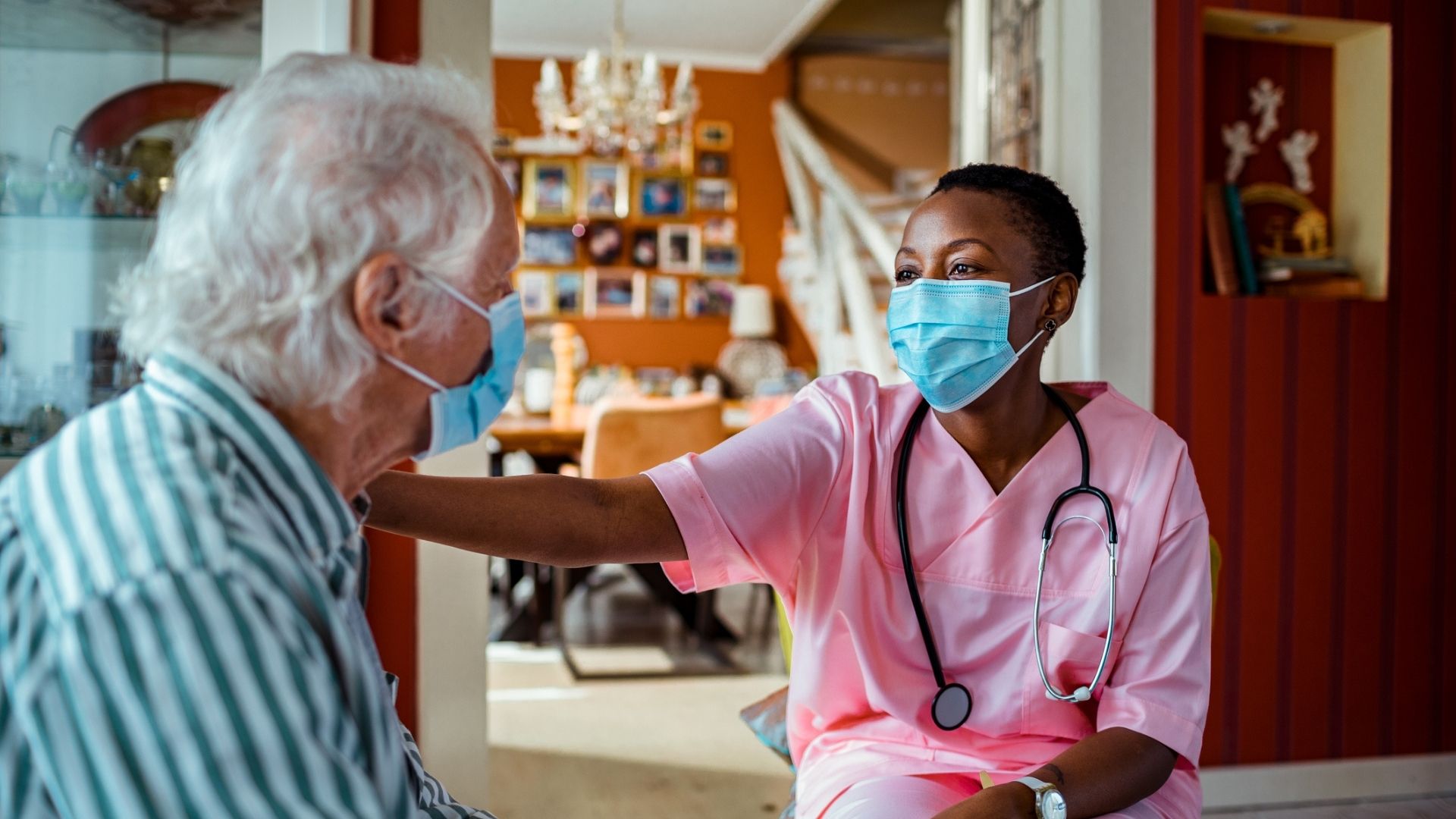| | | | | | | Presented By PhRMA | | | | Axios Vitals | | By Tina Reed ·Oct 29, 2021 | | 🦹 Happy Friday and happy (almost) Halloween, Vitals readers. Today's newsletter is 984 words, or a 4-minute read. - At 12:30 pm ET today, join me for a Vitals Checkup exploring innovations in health care for seniors. Sign up here.
Situational awareness: While Democrats put forward a social policy framework that slashed several major healthcare priorities yesterday, it appears House Speaker Nancy Pelosi is still working on a last-ditch proposal to lower drug costs, STAT reports. | | | | | | 1 big thing: The shot rollout for kids under 11 |  | | | Illustration: Sarah Grillo/Axios | | | | The rollout could begin as early as next week for getting Pfizer-BioNTech's vaccines out to kids ages 5–11. Why it matters: Many parents of young children have been eagerly awaiting this moment for months, worrying about the risks of sending their kids to school without vaccines to help protect their kids from COVID. State of play: The FDA is expected to OK an emergency use authorization for Pfizer's vaccine kids — two shots that are each about a third of the size of the adult dose — by today. The CDC could OK them by Tuesday. What to watch: The Biden administration and Pfizer coordinated to make sure doses will be available in tens of thousands of locations as soon as they are OK'd. - The vaccines may not be available everywhere all at once. For instance, CVS will have the vaccine in "thousands", but not all, of its locations from day one, Christopher Cox, a senior vice president in CVS Health's pharmacy division told Axios.
- But, he said, "I think there will be enough in the market in the first week for that third of the population who will want to rush in."
Between the lines: Experts largely expect about a third of parents will likely want to rush in and get their kids vaccinated as soon as possible. - They are also going to prioritize patients who are most vulnerable to COVID-19 either due to a medical condition or where they live, Claire Boogaard, a pediatrician and the medical director of the COVID-19 Vaccine Program at Children's National Hospital told Axios.
- For others, primary care doctors will be offering them via appointment and clinics, and pharmacies like CVS will begin offering vaccines by appointment on a walk-in basis.
The bottom line: The vaccines are likely coming. But kids won't be fully vaccinated by Thanksgiving. 🎙 Listen in: The Axios Today podcast fields listeners' questions about the vaccine rollout. Go deeper. |     | | | | | | 2. Vaccine benefits outweigh risks, scientists say |  | | | Illustration: Sarah Grillo/Axios | | | | Polls suggest parents are hesitant to vaccinate their young children against COVID-19, but the benefits outweigh the risks, several infectious disease doctors told Axios' Eileen Drage O'Reilly. The latest: The highly transmissible Delta variant changed the pandemic's trajectory: More people — including kids — started getting infected. Children comprise 16.5% of cases, with around 6 million infections and 700 deaths. Risks from vaccines are tracked closely by the FDA and CDC, NIAID director Anthony Fauci and others say. Trial data found Pfizer's COVID shot carries very small risks. - If there were going to be serious side effects from a vaccine in young children, "usually you'd see some signal by now, in animal studies and in other age groups. ... There's been nothing like that, to my knowledge," says Amesh Adalja, senior scholar at the Johns Hopkins Center for Health Security.
What they're saying: "COVID-19 disrupts children's lives. And the more immunity in the population the better," Adalja says. - "This benefits the individual child because they're not going to be held hostage by COVID anymore. They're not going to be quarantined because of an exposure. They're not going to be stuck on virtual learning," Adalja says.
Read more. |     | | | | | | 3. Mixed prospects for vaccinating children |  Reproduced from KFF Covid-19 Vaccine Monitor; Chart: Jacque Schrag/Axios As the push begins to vaccinate children 5–11 against COVID, a similar share of parents will start off enthusiastic about vaccinating their kids as the share of adults did right before their vaccines were authorized back in December of 2020, KFF's Drew Altman writes. By the numbers: 27% of parents say they will get their 5-to-11-year-olds vaccinated right away, according to the October KFF Vaccine Monitor Report. But, but, but: But 30% say they will "definitely not" vaccinate their kids. - Younger adults, the parents of kids 5-11, are less likely to be vaccinated themselves than adults overall. That may be an indicator of their willingness to vaccinate their kids.
The intrigue: One potential influence on vaccinating kids that isn't being discussed and could be utilized: grandparents (especially grandmothers). - 86% of adults 65 and older have had their shots, and they could play a role as advocates for vaccinating kids in communities and families as they often do in public health initiatives around the world.
The bottom line: It will take some time and a concerted outreach effort if vaccination of children 5–11 is to reach the levels we have seen for adults. Go deeper. |     | | | | | | A message from PhRMA | | Fixing health care means putting patients first | | |  | | | | From out-of-pocket costs, to deductibles, to hospital bills – the most vulnerable patients face challenges. 3 in 10 Americans who have insurance still face a financial barrier to care. We need to make the cost of medicine more predictable and affordable. Learn more. | | | | | | 4. The Keytruda boom |  Data: Company filings; Chart: Thomas Oide/Axios Cancer drug Keytruda is on pace to generate more than $17 billion of revenue this year after reaching a record $4.5 billion of sales in the third quarter, Axios' Bob Herman writes. Why it matters: Keytruda is close to becoming the highest-selling drug in the world and would be a Fortune 200 company on its own. - Keytruda represents "the vast majority of the company's revenue growth" and is the company's profit engine, Merck said in a filing earlier this year.
How we got here: Keytruda, which is administered intravenously in a hospital or outpatient office, has been on the market since late 2014 and has shown to be extremely effective. Between the lines: Because Keytruda is given in a health care facility and not picked up at a pharmacy, the drug is billed and paid for in a different way, but still exposes cancer patients to high out-of-pocket spending regardless of their insurance. The bottom line: Keytruda's patent doesn't expire until 2028, and given the lack of federal drug pricing reform, Keytruda will continue to be among the highest-selling drugs. |     | | | | | | 5. Catch up quick | - Penn Medicine's $1.6 billion hospital opens its doors. (Axios)
- Is Moderna really better than Pfizer — or is it just a higher dose? (The Atlantic)
- Mental health conditions can heighten COVID-19 risk, CDC says. (New York Times)
|     | | | | | | 6. Dog of the week |  | | | Gisele. Photo: David Dabill and Robin Bardolia | | | | Meet Gisele, a Thai ridgeback who splits her time in New York and Falls Village, Connecticut, with mom and dad David Dabill and Robin Bardolia. - Don't count on any fun Halloween costumes from their "supermodel," they wrote. "Ironically, Gisele doesn't do clothes."
- Her new brother Arcimboldo, or Archie, however, does.
Arcimboldo. Photo: David Dabill and Robin Bardolia |     | | | | | | A message from PhRMA | | Fixing health care means putting patients first | | |  | | | | From out-of-pocket costs, to deductibles, to hospital bills – the most vulnerable patients face challenges. 3 in 10 Americans who have insurance still face a financial barrier to care. We need to make the cost of medicine more predictable and affordable. Learn more. | | | | Love this newsletter? Share it with your friends! |  | | It'll help you deliver employee communications more effectively. | | | | | | Axios thanks our partners for supporting our newsletters. If you're interested in advertising, learn more here.
Sponsorship has no influence on editorial content. Axios, 3100 Clarendon Blvd, Suite 1300, Arlington VA 22201 | | | You received this email because you signed up for newsletters from Axios.
Change your preferences or unsubscribe here. | | | Was this email forwarded to you?
Sign up now to get Axios in your inbox. | | | | Follow Axios on social media:    | | | | | |
No comments:
Post a Comment